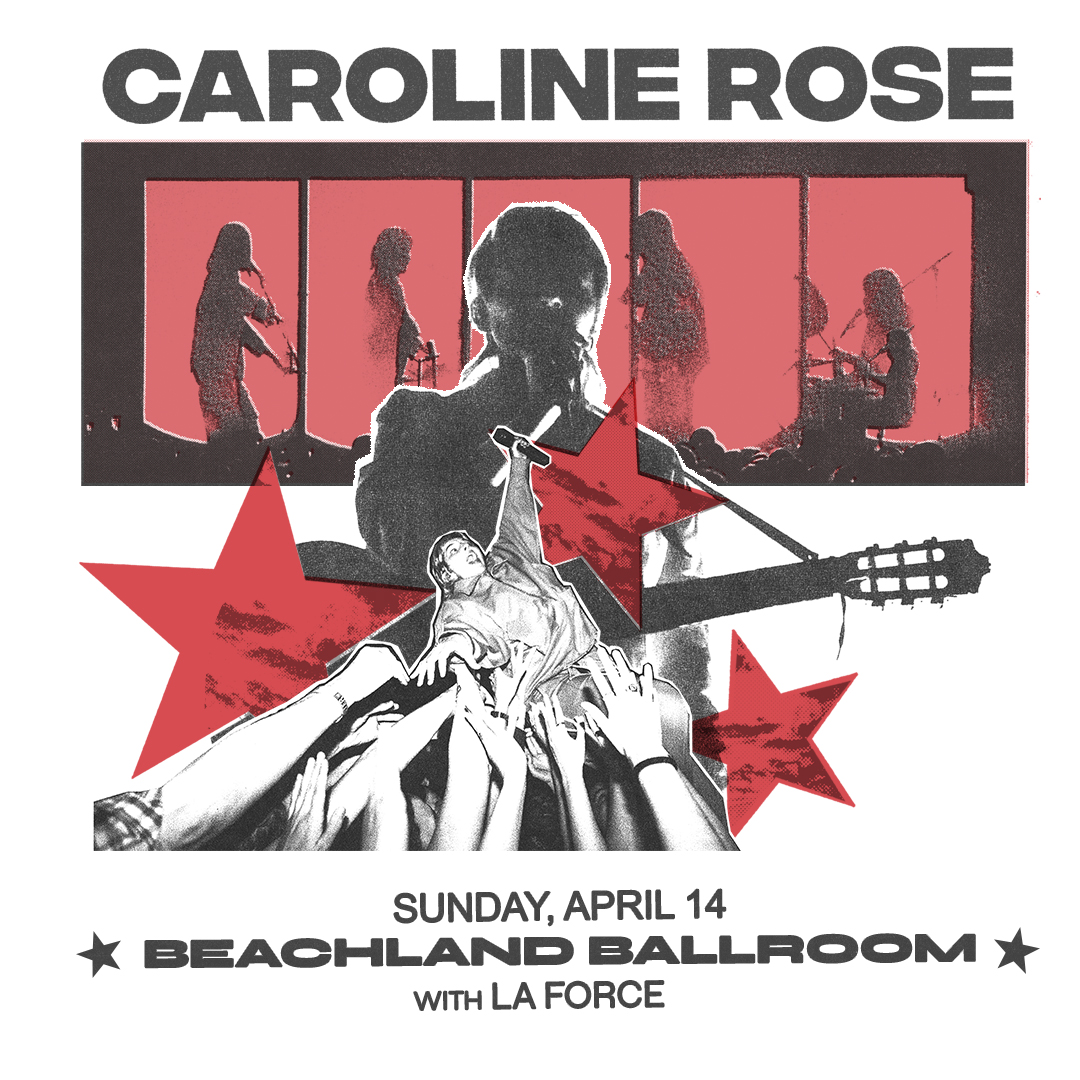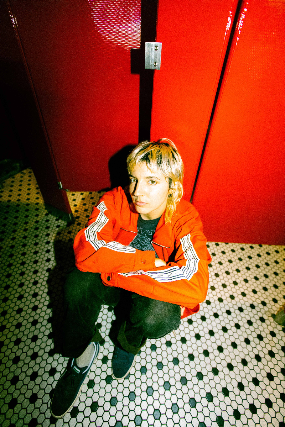
Caroline Rose
with La ForceCAROLINE ROSE’S THE ART OF FORGETTING VIP SCREENING
One GA ticket
Invitation to a pre-show screening of “The Art of Forgetting” short film (This will take place at the venue after soundcheck approximately one hour before doors, Caroline’s team will be carrying gear and use PA, Caroline’s sound guy to run)
Limited edition lyric booklet signed by Caroline Rose
$10 merchandise coupon** and merchandise shopping opportunity before doors open to the public
Commemorative Movie Laminate
Priority entry into the venue
*Note: Merchandise coupon is redeemable at this show only.

"Sometimes you've got to express yourself because if you don't you'll explode," says songwriter/producer Caroline Rose of their latest album, The Art of Forgetting. "...and I felt like I was going to explode.”
After a series of heartbreaking events, Rose had no desire to make a statement, let alone make a new album. It was a time of contemplation and transformation, a time to slow down. What transpired was what the artist considers a gradual union of reconnection and growth. “I was writing songs the way that I used to when I was a kid. It was more like therapy, just sitting down on my bed and writing about what I was feeling. It sounds so simple but I had really gotten away from that.” Dozens of songs followed and a narrative became clear. “It all happened very organically. I wasn’t ambitious. There weren’t any difficulties like most of my other records have had. This one just sort of appeared and seemed to know exactly what it needed to be.”
The Art of Forgetting is a pivotal release for Rose––an artist whose wit and satirical storytelling have made them a name in the indie music scene. It’s an album teeming with raw, intense emotion. Layers of vocal arrangements from Balkan-influenced yawps to Gregorian autotune choirs, acoustic instrumentation chopped and mangled like a glitching memory, and dreamlike synths push and pull to create a hugely dynamic soundscape. Lyrically, the album includes the type of confessional honesty we’ve only caught glimpses of in Rose’s previous work. “I’ve shied away from being very confessional in the past because I’ve always felt that other artists have already carved out that path and are very good at it. I’m a theater kid, I love the drama. My writing style really piggy-backs off the Southern gothics and Southern storytellers in my family, who have always used exaggeration to great effect.”
The album begins with a clenched fist, with a narrator who seems to know who they are only in regard to someone else, or not at all. “I am your love, I am your lover, I am your friend,” Rose says in the opening track “Love / Lover / Friend.” In “Rebirth” the narrator is lost––an orphan, a common man, an unknown in search of comfort. “If that was me then, then who am I now?” Rose questions in “The Doldrums,” an eerie track reminiscent of both Carnival des Animaux and Vespertine-era Bjork. Over the course of the album the author searches for something, anything, with which to ease their pain––a mother’s womb, the kiss of someone new, even death.
Amidst themes of regret and grief, loss and change, shame and the inevitability of pain, Rose’s impish humor pops up unexpectedly. “Stockholm Syndrome,” “Tell Me What You Want,” and “Love Song For Myself” showcase the kind of dark comedy with which we’ve become familiar in their catalog, fusing upbeat melodies with oft-hilariously deflating lyrics. “I’d like to think I’m self-aware enough to know that even when I’m close to rock bottom the view is a comic-tragedy. The biggest difference between this album and my others is I just didn’t have any sort of guard up this time. Everything I’ve said on this record is exactly what I would, and did, tell my therapist.”
No doubt, it gets personal. Rose’s actual therapist, Jill, has a song named after her in “Jill Says”—a sweeping arrangement of floral pianos and cinematic strings. In “Miami,” an acoustic-centered track whose chorus of squealing guitars and bombastic drums seems to all but explode out of the speakers, Rose pulls directly from an intimate conversation with their mother: “My mom always said never victimize yourself | You’ve got to be strong, you’ve got to protect yourself | Y’know, your father and I are in the last stage of our lives, so for god’s sake no more talk of how you imagine dying.” Multiple voicemails from Rose’s grandmother, Mee Maw, are given their own respective moments throughout the album, offering moments of lightness amidst an otherwise heart-rending story of a person who has forgotten, and is perhaps re-learning, how to love themselves.
Memory runs like a current throughout The Art of Forgetting. Prompted by a difficult breakup, Rose began a deep-dive inward, unknowingly digging up long-buried experiences from their childhood. “I was addressing all these painful memories from a recent relationship that meant so much to me, trying to learn from them, but then in the process some even more painful memories would bubble to the surface from when I was a kid. I realized my mind had voluntarily forgotten these traumatic experiences as a means of survival. All the while, I was getting these calls every day from my grandma, who was clearly losing her memory. It got me thinking about all the different ways memory shows up throughout our lives. It can feel like a curse or be wielded as a tool. ‘The art of forgetting’ can mean so many different things.”
With this in mind, Rose produced the album using devices and media that embody the characteristics of fading or faulty memories. “I gravitated toward anything that decays or changes with time––wooden and string instruments, voices, tape, granular synthesis that separates audio into tiny little fragments. I knew I wanted to have songs that would feel complete even if they were played stripped down, so I began by recording the basic layers in my home studio. From there it was about a year of experimenting with those recordings both at home and in a couple other studios––chopping them up into loops and smears, creating modular percussion, and ultimately building any additional parts around them. I thought it was important that any experimentation was done using the songs in their most basic form, so it would feel kind of like a game of telephone with those original recordings.”
Though the path back to self-love is clunky, by the final track, “Where Do I Go From Here?,” Rose is no longer grasping. “Pick yourself up, babe, you’re gonna be fine | take in a deep breath | quit wasting your time | ‘cause everything you love, it’s all gonna die | so pay all your respects and say your goodbyes | now go out and start living the rest of your life.” Albeit begrudgingly, Rose is giving in and letting go. "Every time I make an album I’ll come out of it learning a lot about myself. Now I look back and see the healing of a wound. I feel like a new version of myself. I think one for the better.”

XO SKELETON is the supple, steady, uncanny new album by La Force: a mixture of haunted pop and hot-blooded R&B that glistens at the meeting-point between life, death and love. “In dreams, the dead and living are the same,” Ariel Engle sings on “october,” her voice shimmering. “Maybe that’s why I’m better in the dark.”
“The theme of the album revealed itself in the making,” Engle told me. The title track found its seed in a telephone call between the singer and her life-insurance broker—everyday banalities on the periphery of death. “At one point she said, ‘God forbid you should die,’” Engle recalled. “I was gobsmacked. And a bit hot-tempered. And I said those lines—‘Well, there’s one thing guaranteed: no god or goddess is going to keep me alive.’”
The finality of death? The protection that another person’s love can or cannot bestow? These are heady questions. But more than that they are body questions, matters of breath and flesh and pulse, which is the stuff at the centre of all of La Force’s music—beginning on her 2018 debut and also outward, into Engle’s electrifying work with Broken Social Scene, Big Red Machine, Efrim Menuck, Safia Nolin, and AroarA, her duo with her husband, Andrew Whiteman. La Force’s voice is stunning—somehow luscious and also wise—but so is her point of view—steady, sensitive, physical.
With this LP, Engle originally intended to make a dance record. She worked on cigar-box guitar, piano; she visited NYC for a few days in studio with pros. But everything felt rushed, or forced—and of course the veil of COVID descended over everything—so her music-making shifted home. “It was such an intensely interior time,” she said. Engle’s old friend, co-producer Warren Spicer (Plants and Animals), would come over around “toast o’clock” and they’d work in her basement until lunch, allowing songs to unfold at heartbeat pace, unhurried. This would continue off-and-on for two whole years—a process deeply affected by the place where it took place. “I grew up in this house,” she said. “It’s where my dad died. It’s where I got married. It’s both completely dead and completely alive.” And also itself a kind of exoskeleton—a structure at the threshold between La Force’s inner and outer worlds.
Engle says she has been “unhealthily obsessed” with death since she was a child. “For years I couldn’t look at a night sky because I couldn’t contemplate eternity.” XO SKELETON is therefore a kind of reckoning: a coming-to-terms with the oblivion that bookends a life, but also the “gooey centre” of love, loss, touch, and memory. The skeleton inside of each of us, that symbol of death, is also literally the thing that animates us—which brings us alive. And our bodies, which offer up all the scars and bruises of our years, also carry the intangible: desire, tenderness, judgment.
These nine extraordinary songs are human-scale and intimate, with chord changes like the shifting of limbs, saxophones and processed strings that travel with a vascular ripple. Listen to “how do you love a man,” with its nimble bass and swooning groove, and a title that winks at the beyond. This isn’t some corny love song—its fuller title would be “how do you love a man (Who Doesn’t Know That You Love Him).” Engle asks us how we love the dead; and what to make of this one-way loving, where we have only the memory of reciprocation.
“condition of us,” the opening track, is the portrait of a different kind of adoration—the cloak of kisses, the “XO SKELETON,” provided by a love-affair that’s long-term, messy, fervent and profound. It was the product of “Song A Day,” an invitation-only songwriters’ circle organized by engineer Phil Weinrobe during the depths of COVID malaise. Across three 10-day sessions, Engle created a new song every 24 hours, holding herself accountable alongside friends and luminaries like Leslie Feist, Maggie Rogers, Beck, and Big Thief’s Buck Meek. She wrote “condition of us” alone on GarageBand, tilting like a weathervane. “ouroboros” came out of the same sessions, inspired by the poetry of Ariana Reines, whereas “zipolite” was the fruit of a beautiful dream: Engle was back in the town of Zipolite, in Mexico’s Oaxaca province, a place she had not visited since her teens. Her father was there too, as he had been on that first visit. Picture two bodies on the beach, the sea churning, as he tells her, “I’m OK.”
Throughout these 35 minutes, La Force’s music is electric + vivid, and also tactile + grimy—a sound that enfolds influences as disparate as Tirzah, Unknown Mortal Orchestra, Jazmine Sullivan, the Cocteau Twins, Mica Levi, Tricky w/ Marina Topley-Bird, and even Joni Mitchell’s “Don Juan’s Reckless Daughter.” XO SKELETON bends and turns with its every shift of pulse—mournful, searching, turned on. Like a body, you might say. Or the memory of one.
Beachland Ballroom
15711 Waterloo Road
Cleveland, OH
(map)
